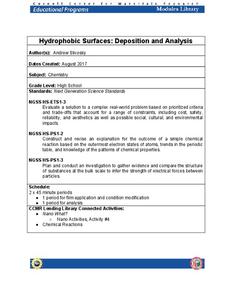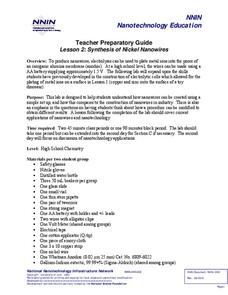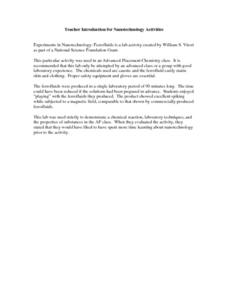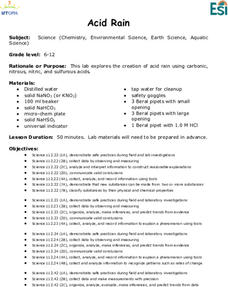Curated OER
Activity #15 The Snowy Christmas Tree
Learners weigh out the proper amount of silver nitrate and prepare the silver nitrate solution. They observe what occurs when pure copper is added to silver nitrate solution. Pupils determine whether the change in the appearance of...
Curated OER
Norman Suburban Activity
Students analyze the factors affecting organisms in the pond ecosystem. In this environmental science lesson, students perform an experiment to determine pH, nutrients and temperature of different pond sites. They present their result to...
Cornell University
Hydrophobic Surfaces—Deposition and Analysis
Couches, carpets, and even computer keyboards now advertise they are spill-resistant, but what does that mean? Scholars use physical and chemical methods to coat surfaces with thin films to test their hydrophobic properties. Then they...
Beyond Benign
Product Test
It's the moment of truth. Previous lessons in the 24-part series had scholars design and develop shampoo formulas using chemical concepts. The 18th instructional activity asks them to test the function of their shampoos. To do this, they...
Beyond Benign
Catalysts and Oxygen
Here is an engaging and hands-on lesson plan that allows high school chemists to demonstrate the effects of a catalyst on various chemicals. They garner knowledge of how reactants and products differ from one another, while analyzing the...
National Nanotechnology Infrastructure Network
The Effects of Gold and Silver Nanoparticles on Brine Shrimp: A Toxicology Study
Who doesn't love gold and silver? Brine shrimp, that's who! Learners conduct an experimental lesson to monitor the toxicity of gold and silver nanoparticles on brine shrimp. They synthesize solutions to expose the brine shrimp to and...
National Nanotechnology Infrastructure Network
Synthesis of Nickel Nanowires
It's all about the scale—they're not just wires, they're nanowires! The second lesson of the series builds on the oxidation-reduction experiment in the first lesson. Scholars synthesize a sample of nanowires using electrolysis. As they...
Curated OER
What Is Special About Polyethylene Food Storage Bags?
Students participate in an investigation in which they compare a polyethylene bag designed for recycling or disposal with a polyethylene food storage bag. Students use hexane to determine the differences between the low density...
Curated OER
# 03 Laboratory Ventilation and Risk Assessment Exercise
Students are introduced to the analysis of health risks in the laboratory, particularly from vapors from organic solvents. They consider quantitative measure of risk such as threshold limit values (TLVs), the amount of the compound that...
It's About Time
Solutions, Suspensions, and Colloids
Chemists are frequently in suspension, but not because they misbehave! Scholars mix various items with water to create solutions, suspensions, and colloids. They test each one to determine their differences and properties. The resource...
It's About Time
Identifying Matter
High schoolers test wood splints that have been soaked in mystery solutions to identify the different colors it produces when lit. The lesson concludes with a reading passage and analysis questions.
Herff Jones Education
Chemical Energy
Provide the class with a quick lesson on chemical energy as they are assisted in creating hot and cold packs to demonstrate energy transfer between objects. They observe the energy change in matter as it transforms and distinguish...
Herff Jones Education
Reaction Rates
Equip pupils with tools to determine reaction rates as they explore conditions that cause a reaction to increase or decrease. They also discuss why this occurs and predict the next steps as they take part in a series of experiments.
It's About Time
Color Reactions that Involve the Transfer of Electrons
Demonstrate the aging of materials as you assist the class in creating rust. Individuals demonstrate oxidation-reduction reactions that result in the rusting of materials, differentiate between materials that will and will not rust, and...
It's About Time
Properties of Matter
Never trust an atom; they make up everything! Young chemists make modeling dough and add another ingredient to change the properties. Scholars then compare the properties of emulsion to composite materials. A reading passage and analysis...
Curated OER
Energy and Matter
A review of a full unit on energy and matter, this slide show starts with basic definitions of states of matter and their mass. It then develops the ideas of the forces that that matter can exert. Details about bonding within matter and...
Cornell University
Nano Interactions
Tiny particles can provide big learning opportunities! Middle school scientists explore the world of nanoparticles through reading, discussion, and experiment. Collaborative groups first apply nanotechnology to determine water hardness....
Curated OER
Seltzer Breath
High schoolers investigate "indicator" (Bromothymol Blue or BTB) to test for the presence of certain chemicals in liquids and gases. They compare distilled water and seltzer water for presence of carbon dioxide.
Curated OER
Radiation In Our World
Students identify the different sources of radiation around us. In this physics lesson, students calculate their estimated radiation exposure per year. They research a current issue about radiation.
Curated OER
Experiment on Measuring Reaction Rates
Learners investigate the rate of a chemical reaction. In this rate of reactions lesson plan, students use an electronic balance to measure the change in mass of a chemical reaction between hydrochloric acid and calcium carbonate. They...
Curated OER
Experiments in Nanotechnology: Ferrofluids
Students explore the world of nanotechnology by synthesizing ferrofluids in a series of chemical reactions. In small groups, they follow the procedure to create the ferrofluids using precise measuring techniques. They test the resulting...
Curated OER
Acid Rain
Learners create acid rain using carbonic, nitrous, nitric, and sulfurous acids.
Curated OER
Making soap you can use
Those textbook experiments are no good. Using this simple method you can make a real bar of soap. It's
Curated OER
Micro-Magic With Sticky Ions
Students view a video about the formation of precipitates. They complete a worksheet that asks them to identify what makes a compound form and what holds it together.

























